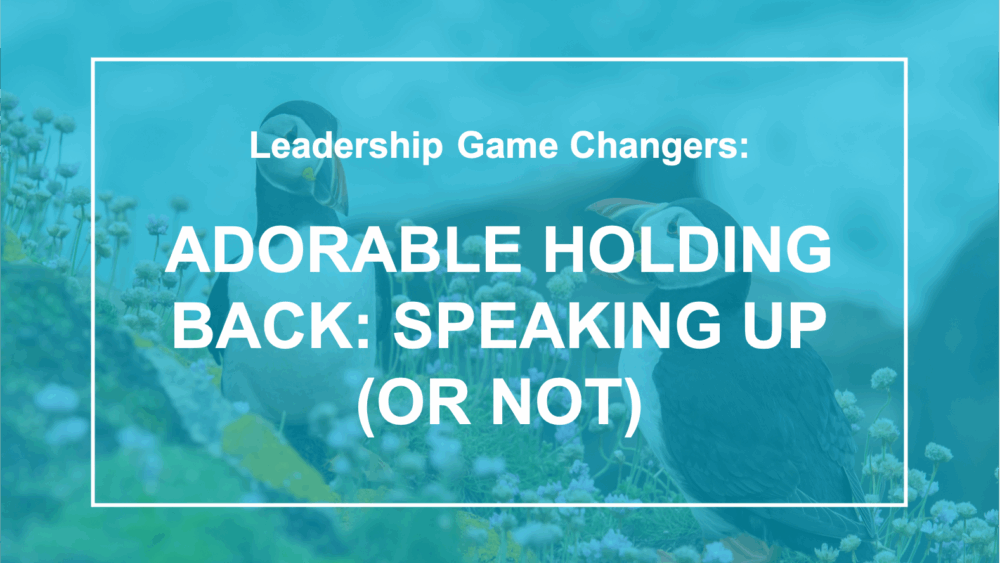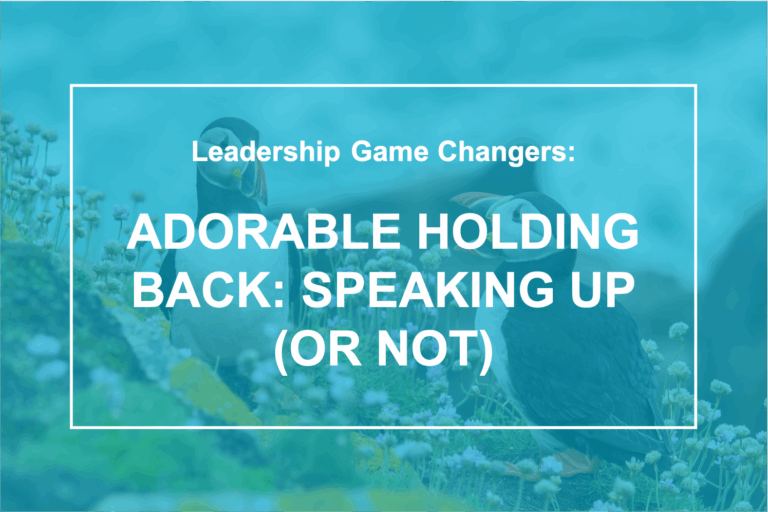Adorable Holding Back: Speaking Up (or Not)
I am a “company coach” for a company that recently has embraced some of the Netflix cultural practices alongside Conscious Leadership. In preparation for a semi-annual offsite, the senior leadership team read No Rules Rules, Reed Hastings and Erin Meyer’s book about the talent, feedback, and freedom culture at Netflix.
During this offsite, we experimented with a live team 360, a meeting during which every attendee agreed to receive candid feedback from every other member of the team. We leveraged Netflix’s 4 A’s of Feedback (Aim to Assist, Actionable, Appreciate, Accept or Discard) for the exercise. We followed the suggestion in the book and did this over a virtual meal. The CEO was first to accept feedback from every team member. As the book recommended we agreed to a rough ratio of giving 75% “constructive” feedback and no more than 25% “complimentary” feedback. It’s my experience that appreciation is very commonly withheld; however, the goal here is to avoid dodging the clear and direct feedback that would up the games of one’s co-workers. With corrective feedback, the book invites participants to offer an observation as well as some actionable means of addressing it.
This group has a high level of trust. It was a great time for this experiment. Doing it over dinner provided more relaxation and levity (two-drink maximum rule was in place). The exercise was a great success.
I’ve done similar round-robin feedback exercises, but this outing revealed something I’d never noticed before: There is a category of feedback that, even though offered as corrective, actually feels to me like it’s complimentary. Now I bring all of my own stories and background to this judgment, as you’ll see, but let me double-click on this.
People often get feedback that sounds negative. Or at least it sounds negative to me, as someone who routinely gets this type of feedback. Here are some examples:
- You can be really determined or righteous when you hold a strong belief. I would find you more effective if you would notice these instances and take extra care to listen to an opposing view.
- You can be really defensive when I challenge you in a public setting. I’d be grateful if after hearing a view that sparks defensiveness or a sped-up reaction, you could just pause and consider the wisdom of a different view before reacting.
- When you’re trying to support your view of things, you sometimes enroll others to support the strength of your position. I’d love it if you’d speak just for yourself as it feels more argumentative to me when you add weight to your argument in this way. I’d also love to hear directly from those others.
- It’s not what you say it’s how you say it.
When I hear feedback in this neighborhood, it sounds negative. Someone who is not at their best is being aggressive, tone-deaf, argumentative, defensive, and brusk. Culturally, I think we label those things clearly as “suboptimal,” to say the least.
In this session with this team, there was another type of “constructive” feedback that emerged. It can best be summarized in a statement like this:
“Bertha, you have so much to offer in your head, but I think you hold back in meetings, and I wish you would come forward more with your viewpoints. I want to hear from you more, and the team would benefit.”
I had such a strong reaction to this type of input that I posted this video on our Inside Coaching Channel.
When I hear this type of feedback, I think of it as a bit of a “back-handed insult.” On its face, it’s corrective, but under the correction is the appreciation for all the brilliant ideas this person has that are being hidden under a bushel. Again, there is clear bias on this point because I am me, but what I hear in this feedback is “you’re amazing, Bertha, and I love you and everything you think, and I would love you even more if you gave me more of you to love.” It sounds fundamentally adorable to me. In this session, it sounded so flattering that I wondered if it belonged in the 75% or the 25% bucket.

Then I realized a couple of blindspots I’ve held here.
First, it is just as costly to a team for a person to hold back their input as it is for a person to over-represent their input. This withholding costs a team growth and productivity. It’s not cute, it’s not generous, it’s a ripoff to the team.
Second, after I ran this thought process by a few people who get this type of feedback, I realized that this feedback is often felt negatively by the people who get it. They are as weary of getting this type of reflection as I am about getting the “it’s not what you say, it’s how you say it” refrain. Holding back hurts these people as much as overreaching hurts me, on the inside. It causes suppressed thoughts, emotions. It causes shame at not being willing or able to contribute or stand up for oneself or an idea. Even though I thought being known as this kind of person (deferential, a great listener, open to feedback) would be yummy, I made the common mistake of projecting my perceptions of these “gentle” and “favorable” words onto others.
Finally, this entire dance between these two broad buckets of feedback helped me see that both of these behaviors are often being driven by a form of scorekeeping that ultimately is unhealthy for the people and for the companies and teams they serve. I’ll explain.
The more outspoken and opinionated folks are, in my experience, keeping track of how often they are talking, how much space they are taking up. They pay attention to who speaks first, whether they are “allowed” to jump in now that others have shared. They soften their language overmuch to avoid an implication that they are being caustic, too direct, or bullying. Now, some of this is healthy, but much of it is an overreaction to the feedback they’ve received. The game isn’t to keep score and measure one’s contributions. The game is to make a choice to contribute versus act from compulsion, urgency, or intensity. When you can find space around your views, around whether or not to voice those views, and around how you share your views, you’ve become a more conscious, self-aware contributor.
The other group — the group that is invited to share more and not hold back — is also keeping score on a different board. I find they are often thinking that in order to voice a contribution, they need to build up enough equity, safety, passivity points. If they have these chips saved up, they have enough stature or reputation in the group to take the risk of outing an opinion. This scorekeeping also is arduous, and it takes these types of contributors out of presence as well. The objective is the same. Can I see this as a choice? I could contribute or I could wait. I don’t need to “earn” the right to make a contribution, I can just notice if I have the impulse, and I can follow that impulse when I see it.
There are important benefits for both types of people of making more conscious contributions. For the more vocal and opinionated types, the conscious action is to “loop” with the group. Be more attuned to who has contributed more versus less. Leverage your platform (which you’ve likely built as an outgrowth of being highly engaged in conversations regularly) for bringing other opinions out instead of filling the space with your own views. For those who lean back before they speak, your conscious move is to pay attention to the internal costs of holding back. Where are you checking out? Where are you building up evidence for future resentment when the position you never shared is missed by the group?
So whether you hear that you’re aggressive or passive in how you show up in group dynamics, you have some work to do, and most of that work is around making your contribution more a matter of choice than of compulsion or a toxic fear of being “wrong.”
PS: If you’d like to see more videos like the one above, join the Inside Coaching Channel using the code FREEMONTH for, you guessed it.


